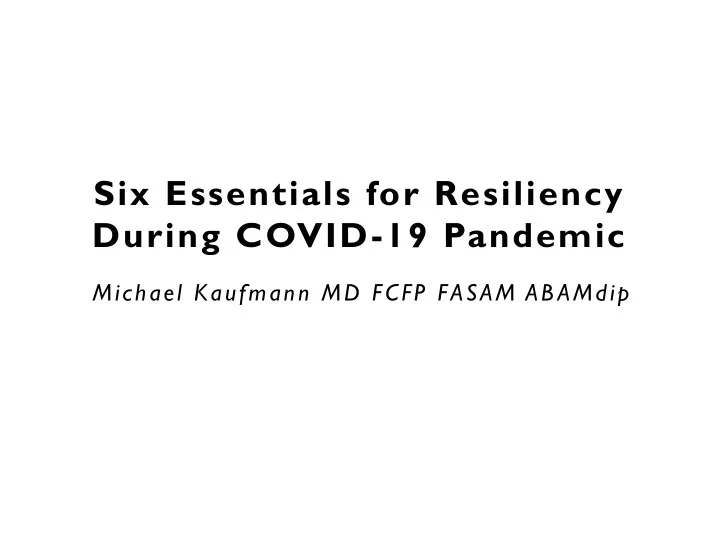

Six Essentials for Resiliency During COVID-19 Pandemic Michael Kaufmann MD FCFP FASAM AB AMdip
Disclosure • Dr. Kaufmann is private consultant in physician health under contract with the OMA Physician Health Program • No conflict of interest to disclose.
Learning Objectives • Describe the psychological impacts of SARS upon healthcare professionals to inform an approach to emotional support, coping and resilience during the COVID-19 pandemic • Demonstrate an approach to self- awareness: “What colour are you?” used by the Canadian military to enhance resilience practices. • Discover six essential personal resiliency practices guided by the BASICS paradigm.
Domains of Physician Wellbeing and Engagement Physician Burnout: The Root of the Problem and the Path to Solutions Catalyst.nejm.org
The Lessons of SARS Maunder et. al. Canadian Journal of Public Health 2008 Two years after outbreak increased chronic stress in healthcare workers: • Burnout • Depression and anxiety symptoms • Increased smoking and drinking • Increased time away from work • Clinically sub-syndromal Therefore enhance models of psychological adaptation and resilience rather than clinical intervention.
The Lessons of SARS Three-pronged approach: 1. Solve the practical problems that are within one’s control. 2. Activate emotion-based coping strategies that enhance support and reduce isolation. 3. Meaning-based coping for events that are unresolved.
NUTS! • N: novelty • U: unpredictability • T: threat – identity/competence/physical health/ego • S: sense of control No wonder we’re stressed! From Dr. Mary Elliott, Princess Margaret Hospital
What colour are you? From Dr. Caroline Gerain-Lajoie, Canadian Medical Association
REACTING HEALTHY INJURED ILL Clinical disorder Normal functioning Common and reversible Severe and persistent Severe functional distress functional impairment impairment from Canadian Armed Forces Road to Mental Readiness
php.oma.org
The BASICS of personal resilience: • B is for Body: physiological health • A is for Affect: psychological health • S is for Social: family, friends, significant other • I is for Intellectual: hobbies, diversions, fun • C is for Community: peer support, other support groups • S is for Spiritual: faith, nature, awe, collective wisdom
B is for Body
1. Look after your physical health EXERCISE …. PLAN: YOUR FOOD HYDRATION SLEEP WELL FOR THE THROUGH THE MOVE! DAY/WEEK DAY From Dr. Joy Albuquerque, Physician Health Program
A is for Affect, Attitude, Awareness https://www.youtube.com/watch?v=w6T02g5hnT4
Jarom-Adair-take-out-the-trash
2. Learn to meditate: • Relaxation – parasympathetic response • Reflection, insight and learning • Non-judgemental awareness in the moment • Mindful response vs. automatic reaction • Many online apps – Ten Percent Happier (tenpercent.com) is my current favourite. Free for health professionals
www.pause4providers.com
3. S is for Social: time with family, friends, life partner My “pan - pals”
4. I is for Intellect: Diversions, hobbies, fun Limit professional reading, news and other activating activities
5. C is for Community: Peer Support Buddy Up! • Form pairs or trios • Choose a platform • Check in every day: What colour are you? From Dr. Mary Elliott, Princess Margaret Hospital
https://www.ruok.org.au/how-to-ask • Ask • Listen • Encourage • Follow-up
S is for Spirit
6. Compassion nourishes the spirit Compassion refers to a deep awareness of the suffering of another coupled with the wish to relieve it. • Attending – noticing • Understanding – what is the cause? • Empathizing – a feeling relationship to the other’s distress • Helping – a thoughtful and appropriate response to offer relief
Not everything that weighs you down is yours to carry!
Genuine and enduring compassion for others requires compassion for oneself. Self-care is not an optional extra.
Six Essentials: 1. Take care of your physical health. 2. Learn mindfulness meditative practice. 3. Cherish your time with family, friends, significant other. 4. Carve out some time for hobbies, interests away from medicine. 5. Buddy-up for informal peer support. 6. Choose compassion for others and yourself.
Resources • You • Family, friends • Peers, including psychiatric colleagues • Faith community / pastoral counseling • Family doctor • EFAP • Physician Health Program – 800-851-6606 • CMA 24/7 Wellness Line • Other
Thank you. Michael.Kaufmann@oma.org Php.oma.org
Recommend
More recommend